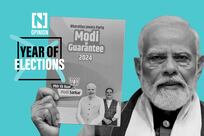DUBAI // The UAE must put greater distance between fast food outlets and schools, promote healthy eating alternatives and demand stricter advertising controls for junk food, experts say.
Speaking at a Global Crisis of Obesity seminar staged by The Economist in Dubai on Wednesday, experts advocated drastic measures to help reduce the region's soaring numbers of overweight and obese people.
Bruce Lee, director of the global obesity prevention centre at the Johns Hopkins Bloomberg School of Public Health, said childhood obesity is a systemic problem.
“Single policies or interventions have not been effective so far,” he said.
“Controls on advertising unhealthy foods would be helpful but that alone will not change things. People move and eat based on their environment. They do what is convenient.
“If they are surrounded by fast food restaurants, with high fat and sugar foods, then that’s what they will consume. Healthy food stores should be encouraged as much as restrictions placed on fast food restaurants.”
Cultural change to encourage cycling to work or walking during lunch breaks should also be promoted, he said.
Latest World Health Organisation figures show 66 per cent of men and 60 per cent of women in the UAE are either overweight or obese, the latter of which is defined as having a body mass index greater than 30.
With 37 per cent of UAE residents classed as obese, the country ranks third in the Middle East, behind Qatar and Kuwait.
Wafaa Helmi Ayesh, director of clinical nutrition at Dubai Health Authority, said it will take a concerted effort from all sectors of society to make change.
“The main problem is when a child finishes their lunch, which may be 500 calories, and then goes out with their friends and visits a fast food restaurant,” she said. “They don’t need the extra 300 or so calories, but take them anyway.
“There must be control over advertising. Not enough is put into promoting healthy food, and it is often more expensive than fast-food or sweets. Currently, the demand for unhealthy junk food is higher, so it becomes cheaper.
“As a government, we are doing our part but people need to take some responsibility for making their own healthy choices.”
World Health Organisation data shows one in five children in the UAE are now obese.
Obesity increases the chance of developing Type 2 diabetes.
It is also a major contributor towards coronary heart disease, accounting for 23 per cent of all cases worldwide, and a major factor in 7 to 41 per cent of cancer cases.
Expenditure on diabetes treatment in the Mena region is expected to rise from US$16.8 billion in 2014 to about US$24.7bn by 2035.
Bollywood actress Zareen Khan, 29, who weighed 100kg before adopting a healthier lifestyle, has used her social media profile to address issues of weight loss and body shaming. She spoke of her success story at the conference.
“I have struggled with my weight all my life and have had to battle obesity and the health implications of that,” she said.
“I loved junk food and did not exercise. I realised that if I did not change, I would be the one dying from a heart attack. I never thought I would be able to lose the weight, but I have.”
Khan changed her eating habits and undertook a daily 30-minute exercise routine. She lost more than 40kg in a few months and has kept the weight off by eating sensible, home-cooked meals and exercising regularly.
She is now a Bollywood star and healthy eating role model.
“It is not about starving yourself, and you can’t be on a permanent diet,” she said. “With regular exercise and a balanced diet, you will soon see the benefits.”
nwebster@thenational.ae





